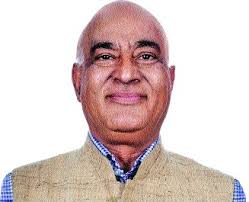Synchronised elections, voter behaviour, and governance outcomes
An active policy proposal of the Government of India is to hold national elections at the same time as the assembly elections of all the states. This article examines whether holding national and stat...
-
 Vimal Balasubramaniam
Vimal Balasubramaniam  Sabyasachi Das
Sabyasachi Das  Apurav Yash Bhatiya
Apurav Yash Bhatiya  28 August, 2020
28 August, 2020
- Articles
Political determinants of newspaper markets in India
Newspapers are an important source of political information for Indian voters. This article looks at how political factors influence the newspaper market. Using the announcement of delimitation in the...
-
 Julia Cagé
Julia Cagé  Guilhem Cassan
Guilhem Cassan  Francesca R. Jensenius
Francesca R. Jensenius  23 November, 2023
23 November, 2023
- Articles
A proposal for public funding of elections and political parties in India
The Finance Minister of India recently introduced measures aimed at cleaning up political party funding in the country. In this article, Gowda and Santhosh highlight the limitations of these measures,...
-
 M.V. Rajeev Gowda
M.V. Rajeev Gowda  Varun Santhosh
Varun Santhosh  21 April, 2017
21 April, 2017
- Perspectives
New ideas for fighting corruption in India
Even as technological innovations have reduced petty bribery, it is clear that bigger forms of corruption are flourishing in India. In this post, Avinash Dixit and Ritika Mankar propose the formation ...
-
 Avinash Dixit
Avinash Dixit  Ritika Mankar
Ritika Mankar  18 May, 2018
18 May, 2018
- Perspectives
Parikshit Ghosh speaks with Karl Ove Moene
There is a view that upsurge in inequality due to globalisation is leading to rising appeal of political platforms that promote inward-looking policies. In this podcast, Parikshit Ghosh (Member of the...
-
 Parikshit Ghosh
Parikshit Ghosh  Karl Ove Moene
Karl Ove Moene  23 April, 2018
23 April, 2018
- Podcasts
Do political parties matter for ethnic violence? The Congress and Hindu-Muslim riots in India
India has seen frequent violent clashes between Hindus and Muslims since independence. This column analyses an important yet largely overlooked driver of ethnic violence: the ruling political party at...
-
 Gareth Nellis
Gareth Nellis  Steven Rosenzweig
Steven Rosenzweig  Michael Weaver
Michael Weaver  02 April, 2018
02 April, 2018
- Articles
Impact of Elite Capture on the Provision of Public Services
The Bihar Rural Livelihoods Project commonly called JEEViKA, is a community-driven poverty reduction programme with the key aim of improving the social and economic empowerment of the rural poor.
-
 Lata Gangadharan
Lata Gangadharan  Tarun Jain
Tarun Jain  Pushkar Maitra
Pushkar Maitra  Joseph Vecci
Joseph Vecci  31 March, 2018
31 March, 2018
- IGC Research on India
Effectiveness fo E-Auctions in Emerging Economies
The primary research goal of this project is to examine whether governments in emerging economies can increase revenues by selling land through e-auctions (anonymous auctions conduced online over a pe...
-
 Venkatesh Kannaiah
Venkatesh Kannaiah  Venkatesh Panchapagesan
Venkatesh Panchapagesan  31 March, 2018
31 March, 2018
- IGC Research on India
Social Networks, Property Rights and Public Services in the Slums of Patna and Jaipur
This project provides important original insight into the factors that condition the capacity of the urban poor to achieve formal recognition of slums, private property rights, and better public servi...
-
 Anirudh Krishna
Anirudh Krishna  Erik Wibbels
Erik Wibbels  28 January, 2018
28 January, 2018
- IGC Research on India
Why is Assam left behind in India's economic boom? A behavioural perspective on the effect of conflict
In addition to having deep, persistent socioeconomic costs, civil conflict can profoundly change individual beliefs, values, and preferences. This project seeks to analyse why Assam – a state where ...
-
 Dipanwita Sarkar
Dipanwita Sarkar  28 December, 2017
28 December, 2017
- IGC Research on India
Why governments across the globe are cracking down on civic organisations
Dupuy, Ron and Prakash content that NGOs need to generate resources from the communities they serve. This will make them accountable to these communities and enhance their legitimacy, and incentivise ...
-
 Kendra Dupuy
Kendra Dupuy  Aseem Prakash
Aseem Prakash  James Ron
James Ron  21 December, 2017
21 December, 2017
- Perspectives
Breaking the clientelist trap: Can reform create demand for good governance in Bihar?
How has over a decade of rapid and programmatic policy reform in Bihar affected voters? Based on a household survey comparing political attitudes of residents on either side of the Bihar-Jharkhand bor...
-
 Jonathan Phillips
Jonathan Phillips  14 November, 2017
14 November, 2017
- Articles
Doing Business in India: Myths and realities
Ahead of the global release of the 2018 edition of the World Bank Doing Business rankings, this column compares data from firm-level surveys conducted by the Bank and the IDFC Institute-NITI Aayog wi...
-
 Mathew Lillehaugen
Mathew Lillehaugen  Milan Vaishnav
Milan Vaishnav  25 October, 2017
25 October, 2017
- Articles
The power of enforcement: State capacity and child marriage in India
In an attempt to deter child marriage, a recent Supreme Court verdict has criminalised sexual relations between a man and minor wife. Worldwide, more than 700 million women alive today were married be...
-
 Tanushree Goyal
Tanushree Goyal  Sam Van Noort
Sam Van Noort  24 October, 2017
24 October, 2017
- Articles
Political Change and Crime Reduction in Bihar
The aim of this project was to understand the mechanisms through which the political changes in 2005 contributed to the dramatic subsequent reduction in violent crimes. This project is an extension of...
-
 Oliver Eynde
Oliver Eynde  Clément Imbert
Clément Imbert  Nishith Prakash
Nishith Prakash  12 October, 2017
12 October, 2017
- IGC Research on India
Twitter feed
Tweets by Ideas4IndiaMost Popular Governance Posts
Unique Health Identification and Aadhaar: A case for mandatory linkage
As part of the Digital India initiative, All India Institute of Medical Sciences (AIIMS) issues a Unique Health Identification (UHID) number to each patient, which documents their entire journey in th...
 Mudit Kapoor
Mudit Kapoor  23 December, 2016
23 December, 2016
- Perspectives
Caste dominance in rural India: Cause and effect
Rural India remains a caste-based society. This column explores why caste continues to play such an important role and what the effects are. It argues that trade and agricultural productivity suffer, ...
 Siwan Anderson
Siwan Anderson  16 August, 2012
16 August, 2012
- Articles
Why did the Indian economy stagnate under the colonial rule?
How did the Indian economy fare under the colonial rule? Is the average Indian significantly better off after Independence? This column examines trends in GDP per capita in order to determine the stan...
 Aniruddha Bagchi
Aniruddha Bagchi  16 September, 2013
16 September, 2013
- Articles





 16 November, 2023
16 November, 2023






